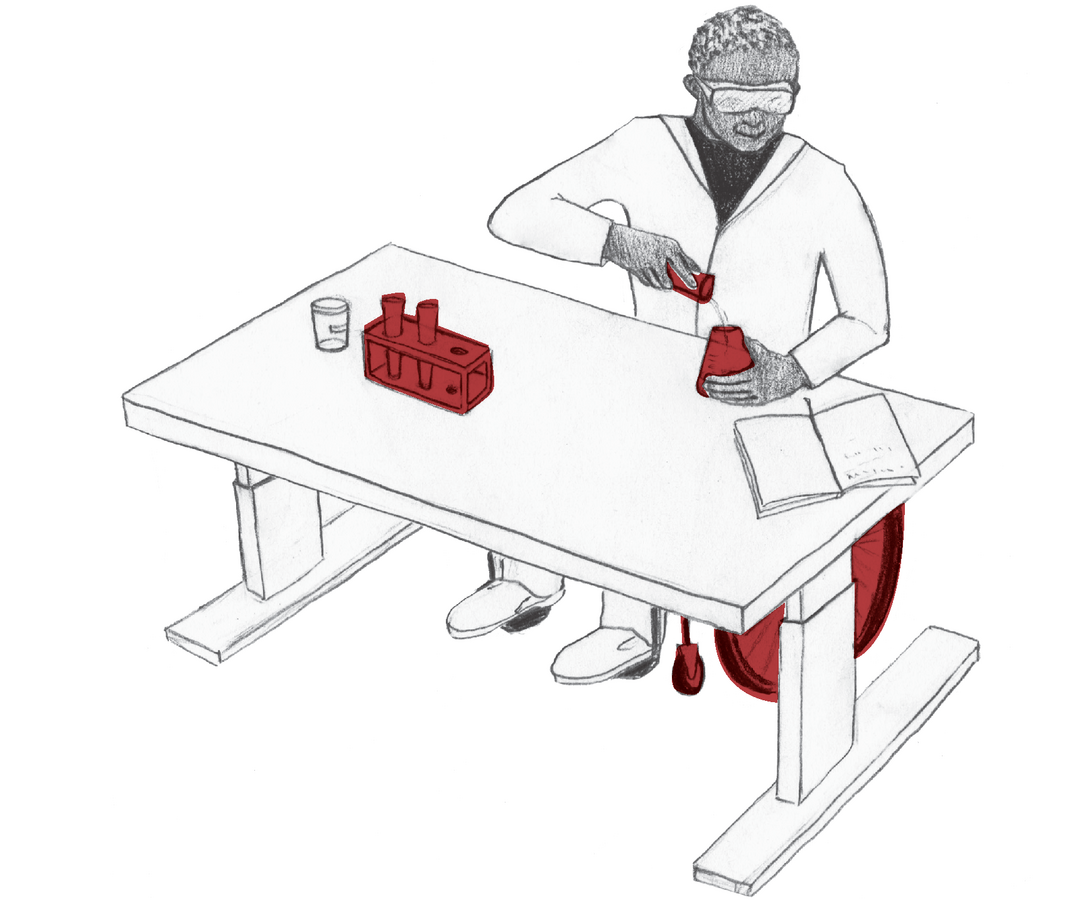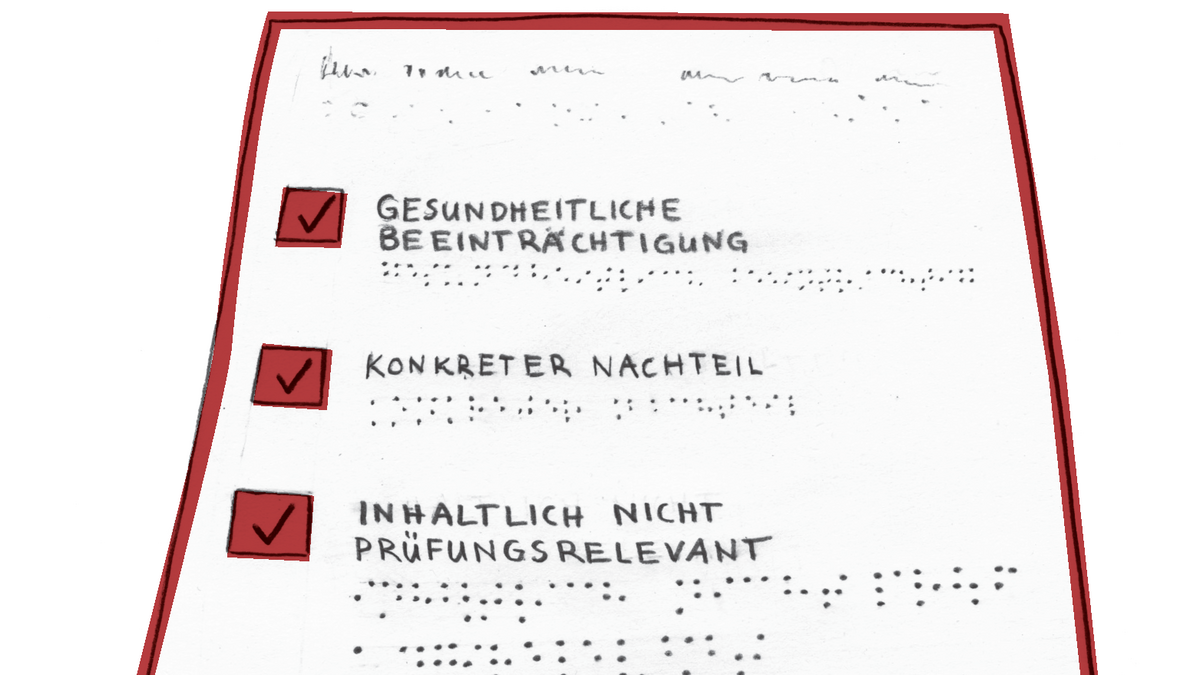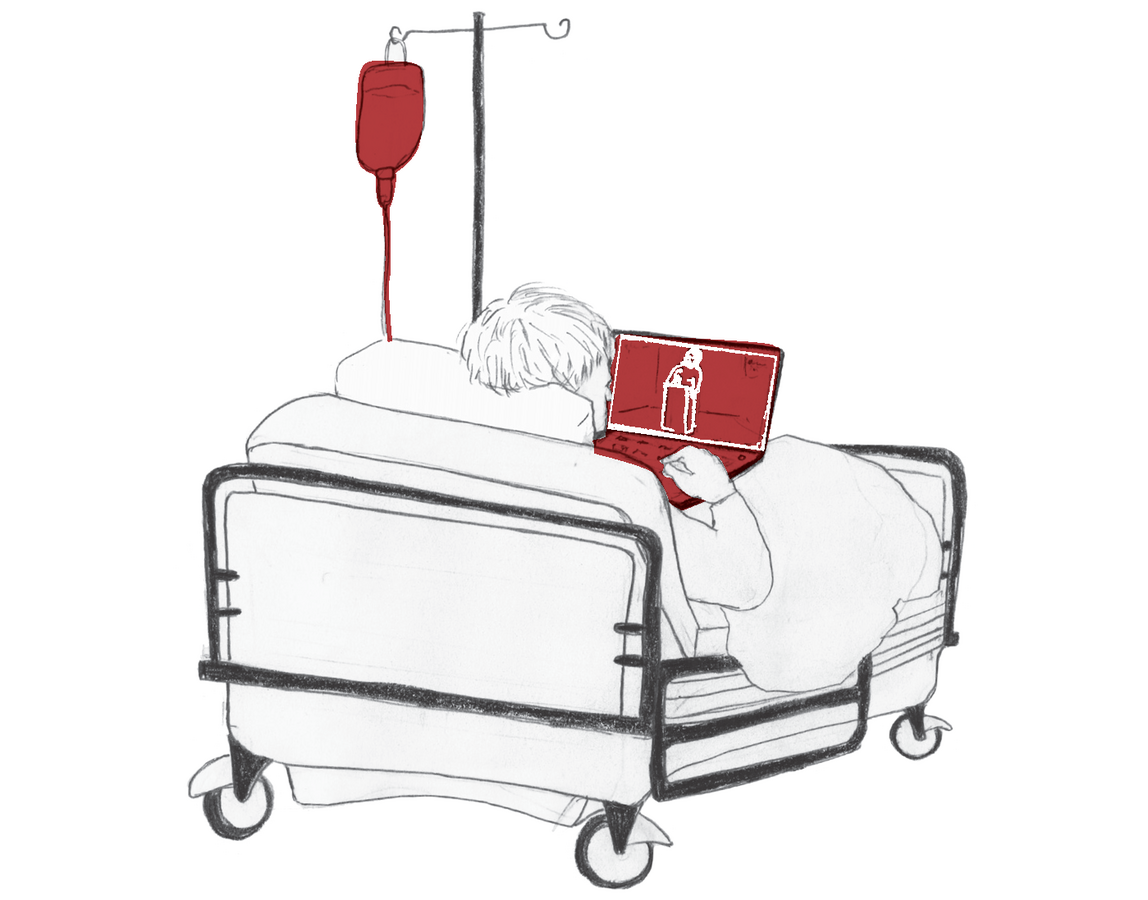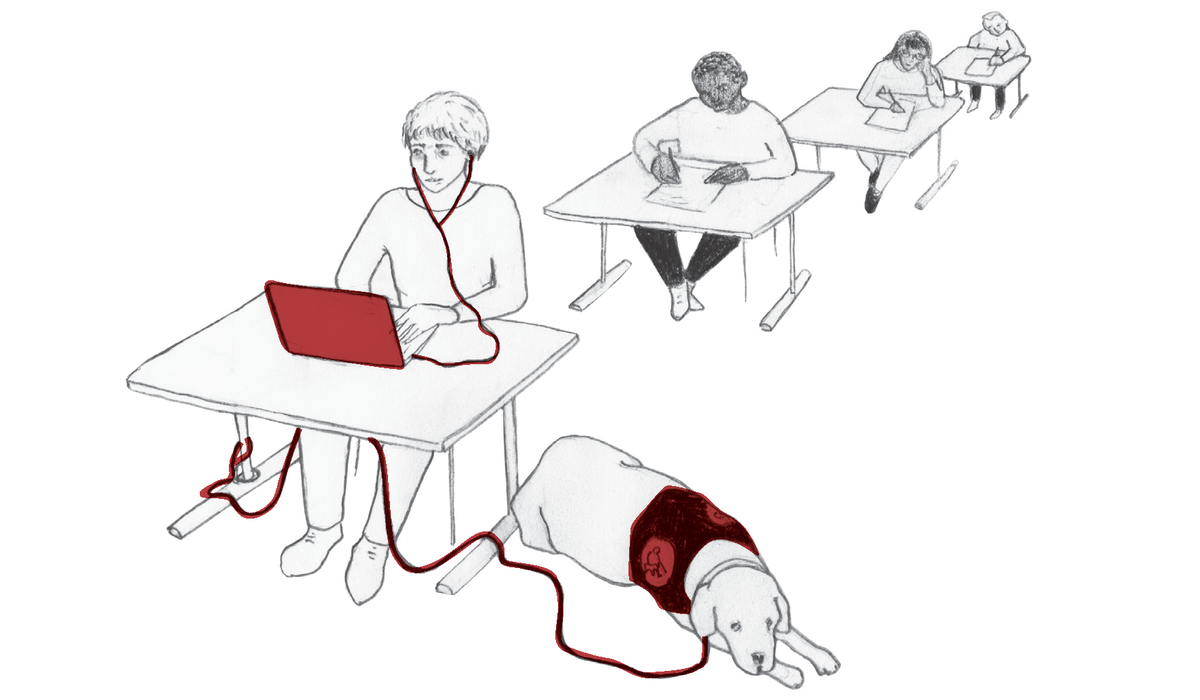A disability or chronic illness should not stand in the way of required achievements. The recognition of hardship cases and the compensation for disadvantages ensure equal opportunities in studies and in examinations.
Individual consultation
Here you will find an overview of contact points that offer individual consultation.
Access and admission to studies
The Student Advisory Service offers information on general questions regarding application, admission requirements, aptitude tests and admission procedures, among other things. The Student Office advises on all administrative matters for admission to studies, including applying for hardship or disadvantage compensation and the required evidence.
Advanced training
The Commissioner for Handicapped and Chronically Ill Students organizes regular staff training courses on compensation for disadvantages. Further information can be found in the staff training database.
Conflicts and solutions
The contact for study offices, teaching staff and Examination Committees in the case of complex (guidance) cases is the Commissioner for Handicapped and Chronically Ill Students.
Students with impairments at Leipzig University: heterogeneous and often invisible
62.1 % of students with impairments that make it more difficult for them to study have mental illnesses. 13.4 % have a physical impairment. Only in the case of 1.9 % of the students at Leipzig University with impairments that make it more difficult for them to study are these impairments immediately apparent.
Requirements for the compensation for disadvantages
In addition to the definition, you will find further explanations of the individual requirements with numerous examples below. Not all regulations for determining aptitude, study or examination regulations contain provisions for compensation for disadvantages. In this case, the entitlement to compensation for disadvantages arises from Article 3 (1) of the Constitution (Grundgesetz).
- Definition: Disability-related disadvantage compensation
It refers to the modification of examination or study conditions in order to compensate for disadvantages due to a disability or chronic illness of an examinee, which do not affect the performance to be examined, but only make it more difficult to demonstrate.
Students with a disability are entitled to apply for compensation for disadvantages. According to Article 1 paragraph 2 of the United Nations Convention on the Rights of Persons with Disabilities, the term “persons with disabilities” applies to “[...] persons who have longterm physical, mental, intellectual or sensory impairments which, in interaction with various barriers, may hinder their full and effective participation in society on an equal basis with others”.
In principle, this definition of disability covers all long-term health impairments and so-called specific developmental disorders (for example dyslexia). Chronic diseases in the sense of long-term illnesses that are difficult to heal are also categorised as “disabilities” if they lead to limitations in social participation in interaction with barriers. This covers both mental illnesses and chronic somatic diseases and disorders of an episodic nature (for example rheumatism, epilepsy, multiple sclerosis or allergies).
This covers both mental illnesses and chronic somatic diseases and disorders of an episodic nature (for example rheumatism, epilepsy, multiple sclerosis or allergies), whereby the distinction between obstacles to performance and weaknesses in performance is difficult. The argumentation of case law, parts of the legal literature and the lived practice of the universities are far apart. In the end, each Examination Committee decides on its own responsibility. Due to the complexity of the topic, you can find more information under Mental and Chronic Somatic Illnesses.
Students with the following impairments, for example, may be entitled to compensation for disadvantages if their impairment leads to obstacles during their university studies and limitations in participation:
- Hearing, speech, visual, skeletal or muscular impairments
- Chronic somatic diseases or disorders (for example rheumatism, Crohn’s disease or diabetes mellitus)
- So-called specific developmental disorders (for example dyslexia or dyscalculia)
- Autism spectrum disorders and other impairments
This list of examples is not exhaustive. Each concrete individual case must always be assessed to determine whether limitations in participation exist. The type and degree of impairment should play no role in this assessment. If German legal norms (for example in individual examination regulations) use a narrower definition of disability, this must be explained on the basis of the UN Convention on the Rights of Persons with Disabilities and therefore understood as a broad definition in accordance with the Convention.
The impairment identified should be a health impairment diagnosed according to a recognised classification system, for example ICD-10- GM. Being registered as severely disabled or having a determined degree of disability is not a requirement. For more information on the aspect of evidence, please refer to content and evidence.
The existence of a health impairment (for example a determined degree of disability) alone is not sufficient to claim entitlement to compensation for disadvantages. The impairment must actually make it more difficult for the student to comply with the stipulated examination and study conditions in the individual case concerned.
- Example
A student with severe episodic limited mobility in her hands has a concrete disadvantage compared to her fellow students when taking a written examination. In contrast, this limited mobility would not be disadvantageous in the case of an oral examination.
Only impairments or disadvantages that have no relevance to the examination in terms of content can be granted compensation for disadvantages. The student must in principle be able to demonstrate the skills and knowledge that are tested in the examination.
- Example
As part of a degree course in chemistry, students are required to demonstrate their skills in laboratory techniques within the scope of a practical examination. Given the spatial conditions in the laboratory, a chemistry student who is a wheelchair user faces an impediment to demonstrating her skills. Compensation for disadvantages in the form of a wheelchair-compatible, height-adjustable table allows the student to demonstrate her skills.
Performance weaknesses that lead to a decrease in the skills and knowledge that students are required to demonstrate in the examination, however, are not entitled to compensation for disadvantages. The examination purpose in question must be considered in order to judge whether the individual case concerns performance weaknesses or impediments to performance that are entitled to compensation for disadvantages.
- Example
A student with dyslexia, for example, cannot be granted compensation for disadvantages if the determination of the student’s spelling ability is the purpose of the examination, namely a/the examination subject.
Important
Only the framework conditions are changed and not the content of the examination or the course of study. The required performance always remains the same for all students!
Procedure
Students with impairments who require compensation for disadvantages in examinations (including final theses) must submit an application for compensation for disadvantages to the responsible Examination Committee. Also for special forms of courses or performances (for instance laboratory work, internships, excursions). As well as for the organisation and execution of studies (for example, attendance requirements, sequence of courses or modules).
- Important
The following diagram depicts a highly simplified and standardised procedure. In concrete individual cases, the regulations of the faculty concerned always apply (especially with regard to deadlines and evidence)! If examinations are taken in more than one subject at different faculties, more than one application must be submitted to the respective Examination Committee of the relevant faculty.
- Information
The student contacts the responsible study office to find out about the application process, and the eligibility requirements in particular, as early as possible. - Evidence
The student obtains the required doctor’s certificates (if not already available). Recommended is the use of Appendix 2: Confirmation form for doctors and psychotherapists ENG / DEU. - Submitting an application
The student submits a written application for compensation for disadvantages to the responsible Examination Committee as early as possible and four weeks before the examination or start of the assessment period at the latest. Recommended is the use of Appendix 1: Application form for compensation for disadvantages ENG / DEU. - Decision
The responsible Examination Committee decides on the application and informs the student of its decision in writing one week before the examination or start of the assessment period at the latest.- Approval
The Examination Committee informs all individuals and bodies relevant to or responsible for the implementation of compensation for disadvantages. The compensation for disadvantages is implemented. - Rejection
The applicant can accept the (partial) rejection or file an objection with the Examination Committee within four weeks.
- Approval
Form
The application must be submitted to the responsible Examination Committee in writing. If the application is submitted via e-mail, the student e-mail address should be used. Students are recommended to use the corresponding application form provided by the University (Appendix 1: Application form for compensation for disadvantages ENG / DEU). Applications can, however, also be submitted in writing without a form.
Deadline
The application must be submitted before the examination. Applications will not be accepted after an examination.
In concrete individual cases, the regulations of the faculty concerned always apply (especially with regard to deadlines and evidence)! If there are no regulations, the application should be submitted to the responsible Examination Committee at least four weeks before the examination or start of the assessment period. If the reasons for compensation for disadvantages only arise after this deadline or the examination candidate only becomes aware of them after the deadline, the application must be submitted immediately.
Submitting applications at an early stage is important in order to guarantee that the Examination Committee has a sufficient amount of time to assess the case and make a decision (and clarify any questions that arise during this process with the student, for example). Furthermore, the implementation of compensation for disadvantages in terms of the organisation of examinations also requires time, for example in the case that a separate room needs to be organised.
Applications submitted at short notice may be necessary if the impairment is only diagnosed at short notice. The reason for such an application at short notice should also be specified in the application or the evidence submitted (cf. content and evidence). The Examination Committee should provide the applicant with written confirmation that the application has been received.
Content
The application must indicate the extent to which a longer-term health impairment exists and what negative impact arise from the stipulated examination or study conditions. It should also specify the desired modification of the examination or study conditions, namely the desired compensation for disadvantages, as concretely as possible. The content of the application should therefore enable third parties to understand the situation based on the documents submitted and to assess the proposed measures.
In the case of proven or clearly longer-term or permanent limitations, the application can refer to a longer period, right up to the entire duration of the applicant’s university studies. It is important to bear in mind that, given that compensation for disadvantages always refers to individual conditions (impairment, impacts of the impairment on the examination and examination subject), a single decision for a longer period can only be made under certain circumstances (e.g. an examination format that remains the same).
The application should contain the applicant’s enrolment number, study programme, surname and first name, address and e-mail address.
Evidence
- Important
A concrete diagnosis (ICD-10 code or similar) or anamnesis does not need to be provided! Evidence of being registered as severely disabled is also not required when applying for compensation for disadvantages. Such registration alone does not justify entitlement to compensation for disadvantages. A determined degree of disability also plays no decisive role in the granting and arrangement of compensation for disadvantages.
The existence of the longer-term health impairment must be proven by means of suitable evidence. Presentation of a copy of the evidence is usually sufficient.
Given that there is a multitude of impairments, there is also a wide range of professional responsible medical occupational groups who can provide expert assessments of impairments. The following documents, among others, can therefore be used as suitable evidence for an application for compensation for disadvantages:
- Certificates from (specialist) doctors
- Certificates or reports on diagnostic findings from qualified psychotherapists with a university degree in Psychology
- A confirmation form from Leipzig University on impairments relevant to university studies filled in by a doctor or psychotherapist (Appendix 2: Confirmation form for doctors and psychotherapists ENG / DEU)
- Treatment reports from hospital and rehabilitation stays
- Discharge summaries on inpatient and semi-residential stays
- Statements by rehabilitation institutions or notifications of approval from integration funding and assistance institutions
- School certificates on approved compensation for disadvantages (at upper secondary school level (Sekundarstufe II) or within the scope of “Abitur” examinations or similar university entrance examinations)
- Evidence of registration as severely disabled or a notice of assessment from the social security and pensions authorities
- Notification of approval from a funding institution, for example for services listed under Sections 53 and 54 SGB
- Statement from the Commissioner for Handicapped and Chronically Ill Students can be produced and submitted in individual cases if the original evidence contains a diagnosis or anamnesis and this should not be disclosed
The evidence should usually be as recent as possible, although no general requirement can be stipulated in this case either due to the wide variety of different impairments. In cases in which the diagnosis was made when the student was a child and the impairment is no longer treatable or no longer requires treatment, for example, obtaining an up-to-date medical certificate may be complex and unnecessary (as is often the case for students with dyslexia in particular). In such cases, considerations should be made as to whether an older certificate (in connection with confirmation from the student’s general practitioner) is sufficient given that medical certificates involving diagnostic procedures are often very expensive.
The expenses for the evidence submitted must be borne by the applicant.
Objection
The decision on compensation for disadvantages is an administrative act, the implementation of which can be reviewed with recourse to the administrative court. The respective examination regulations contain information on the requirements for possible opposition proceedings. If compensation for disadvantages has already
Obligation to report problems immediately
If compensation for disadvantages has already been granted and is not correctly implemented during the examination, the examination candidate has an obligation to report problems immediately. If, for example, a time extension or granted pauses are not provided in accordance with the application during the examination, this must be reported to the examination supervisor or examiner immediately. Problems cannot be reported after the examination.
- Note
The applicant is generally responsible for procuring any aids or resources. The costs of a writing aid with no prior subject-specific knowledge or an assistant for practical examinations or internships are regularly covered by the regional social welfare (Sozialhilfe) institution or the integration funding and assistance institutions. A pool for hiring aids and resources for the implementation of compensation for disadvantages (for example laptops with speech output) has also been established at the University and an accessible workstation for examinations has been created (cf. Appendix 3).
What ist a compensation for disadvantages? Example...
A student who is generally able to demonstrate the skills and knowledge required needs to take breaks during a long written examination due to a chronic somatic disease. If she were forced to complete the examination under the applicable conditions, namely without any breaks, she would have a disadvantage compared to her fellow students. The Examination Committee therefore grants her compensation for disadvantages in the form of an extension of the examination duration for the time actually taken for breaks during the examination. This enables the student to take the examination under equal conditions.
Potential measures
Possible approaches and examples of compensation for disadvantages.
The decision on the form of compensation for disadvantages is at the discretion of the Examination Committee as the responsible examination authority. When making this decision, the Examination Committee is not bound to medical recommendations or the proposals made by the applicant but should factor these into the decision as important expert assessments. The scope of discretion of the Examination Committee with regard to the arrangement of compensation for disadvantages is limited by the principle of “full compensation for disadvantages: yes; privilege: no”.
- no under-compensation
This means that the type and scope of compensation for disadvantages must be determined in a way that ensures that the limitation when providing evidence of academic performance is fully compensated for (no under-compensation). This means that the compensation for disadvantages not only enables the applicant to ‘somehow pass’ the examination but also gives them the opportunity to provide evidence of all of their skills and knowledge to the full extent. - no privileged overcompensation
The type and scope of compensation for disadvantages must be determined in a way that ensures that the disadvantage is not ‘overcompensated for’. The applicant must not receive privileges over fellow students.
- Example
The applicant requires several short breaks due to a chronic disease. They therefore submit an application to extend their written examination duration by 60 minutes to the Examination Committee. In contrast, the Examination Committee grants them an extension for the time actually taken for breaks.
Only modifications concerning conditions and forms of evidence of academic performance are generally possible. The qualification objectives specified in the Study Regulations are unaffected by compensation for disadvantages; the content-related requirements must remain in place. The replacement of one examination format with another must be checked particularly carefully and is only permitted when there are no other possible measures for compensating for the disadvantages. The use of a different assessment standard or not assessing a (partial) component are not possible.
In all cases, information that is as precise as possible with regard to the impacts of the individual impairment on the examination performance required and on the conditions of the examination concerned is required for a qualified decision on the selection of measures of compensation for disadvantages. A separate decision based on the individual case in question must therefore always be made with regard to the type and form of compensation for disadvantages.
The student with a disadvantage is the expert when it comes to their own disadvantage, its impacts and potential compensation measures. The Examination Committee should therefore involve students in the decision-making process, or the decision on the concrete compensation measure should be made ‘in consultation’ with the examination candidate concerned. Universally valid recommendations in the form of a fixed ‘catalogue’ cannot, be formulated. The following table can therefore be used as an orientation tool.
- Important
The choice of measures must be oriented towards the principle of equal opportunities and not based on the resources available. Rejecting an extension of the examination duration or assessment period due to a lack of supervisors is therefore, for example, not permitted. A so-called ‘resource-based reservation’ can only be expressed within stringent limits.
| Basic approaches | Example |
|---|---|
| Adjusting the deadlines stipulated for modules or study stages | Deadline extensions for modules or study stages |
| Admission to exams | Admit to examinations with the proviso that admission requirements are demonstrated later, for example, to avoid loss of cohort or longer duration of study |
| Adjusting times for study and examination components |
|
| Accessibility of the location or room in which examinations are held | Involving students concerned with regard to examination buildings, for example only certain buildings, or examination rooms, for example only certain seats or fixtures and fittings such as lighting, acoustics, flooring, movement area, wheelchair-compatible tables or height-adjustable chairs |
| Form of presentation of tasks and assignments |
|
| Assistance when completing in-class components |
|
| Use of aids and resources when completing in-class components |
|
| Activities relating to health impairments during the completion of in-class components |
|
| Social constellations (independent of the examination format) |
|
| Replacing an examination format with an alternative format | Replacing intended forms with other forms at the same level that are ideally typical of the study programme and enable the student to also achieve the qualification or learning objectives, especially:
|
| Excursions |
|
| Compulsory internships |
|
| Compulsory time spend abroad | The option of replacing compulsory time spent abroad with other components involving the same workload if time spent abroad is not possible for health reasons |
Source: Gattermann-Kasper (2018), Nachteilsausgleich für Studierende mit Beeinträchtigungen, p. 29 ff.
Compensation for disadvantages for the organisation and completion of university studies may be necessary if study and examination regulations do not provide much scope for the individual arrangement of university studies. Students with impairments actually often depend on such scope. Given that the same impairments can have extremely different impacts and the requirements of each subject are always individual, general guidelines for compensation for disadvantages for the organisation and completion of university studies are not possible. The individual case plays the deciding role, and individual solutions must be found.
- Examples
Both therapy and rehabilitation measures and necessary breaks that cannot be planned in the case of acute symptoms caused by chronic diseases require time, organisational efforts and energy alongside university studies. Over the course of their university studies, students with impairments also encounter a variety of (physical, communicative or educational) barriers that may have a negative impact on and extend the duration of their studies, for example lecture theatres that are not accessible to wheelchair users, a lack of audio induction loop systems in seminar buildings, literature that is not provided in an accessible form or a lack of aids and resources for laboratory work.
Given this wide range of fields of activity and possible measures, responsibilities and contacts, there is no formal (application) procedure for compensation for disadvantages for the organisation and completion of university studies. The general rule is that the bodies that are usually responsible for the field of action concerned are also responsible for compensation for disadvantages. Guidance on special study schedules, for example, is provided by the responsible study office, and the schedules are subsequently agreed in writing with the Examination Office. Given that there are no deadlines for such measures of compensation for disadvantages, but the implementation can be complex, students should be sure to obtain information and make arrangements in good time.
- Important
The entitlement to compensation for disadvantages also applies to the organisation and completion of university studies. In case of doubt, these students can therefore also submit a written application for compensation for disadvantages to the Examination Committee and additionally have the option of filing an objection in the case of (partial) rejection of the application. The rule that the implementation or organisation of compensation for disadvantages cannot simply be passed on to the student also applies in such cases!
| Basic approaches | Example |
|---|---|
| Allocation of places in courses with limited participation |
|
| Compulsory attendance |
|
| Sequence for completing of modules or achievements |
|
Source: Gattermann-Kasper (2018), Nachteilsausgleich für Studierende mit Beeinträchtigungen, p. 33.
Q&A
Here you will find answers to frequently asked questions.
Where do I have to submit the application for disadvantage compensation?
You must submit your application for disadvantage compensation to the relevant Examination Committee or Examination Office in good time. In some courses of study, however, the examination is not conducted by the University of Leipzig. These include examinations at the state level of the courses of study in teaching, law, medicine, dentistry, veterinary medicine or pharmacy. In this case, you must submit the application to the corresponding Examination Office. Processing then usually takes longer. You may also need time to file an appeal.
What do I have to consider when studying several subjects?
Are you studying several subjects at the same time, for example in your teacher training? Please note that you may have to apply to different Examination Committees for compensation for disadvantages in the individual subjects.
How to distinguish between compensation for disadvantages and cases of inability to take an examination or withdrawal from examinations?
Is the impairment an acute, temporary health impairment (for example a bad case of the flu)? In this case, inability to take an examination may apply and withdrawal from the examination comes into consideration. Is the impairment a longer-term health impairment that only makes it more difficult for the student to demonstrate the skills and knowledge being examined although they generally have these skills and knowledge? In this case, compensation for disadvantages normally applies.
In such cases, longer-term health impairments can definitely be assumed if they extend over a period of more than six months, although this is not a strict timespan. Deviations from this fundamental distinction
can be made in individual cases (Intranetlink: guide, p. 13.).







